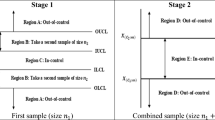Abstract
We consider a closed Jackson—like queueing network with arbitrary service time distributions and derive an unbiased second derivative estimator of the throughput over N customers served at some node with respect to a parameter of the service distribution at that node. Our approach is based on observing a single sample path of this system, and evaluating all second-order effects on interdeparture times as a result of the parameter perturbation. We then define an estimator as a conditional expectation over appropriate observable quantities, as in Smoothed Perturbation Analysis (SPA). This process recovers the first derivative estimator along the way (which can also be derived using other techniques), and gives new insights into event order change phenomena which are of higher order, and on the type of sample path information we need to condition on for higher-order derivative estimation. Despite the complexity of the analysis, the final algorithm we obtain is relatively simple. Our estimators can be used in conjunction with other techniques to obtain rational approximations of the entire throughput response surface as a function of system parameters.
Similar content being viewed by others
References
Baker, G. A. 1975. Essentials of Padé Approximants. Academic Press.
Bao, G., Cassandras, C. G., and Zazanis, M. 1996. First and second derivative estimations for cyclic closed queueing networks, IEEE Trans. on Automatic Control 41(8): 1116–1136.
Bertsekas, D. P. 1982. Dynamic behavior of shortest path routing algorithms for communication networks. IEEE Trans. on Automatic Control AC-27(1): 60–74.
Bertsekas, D. P., Gafni, E. M., and Gallager, R.G. 1984. Second derivative algorithms for minimum delay distributed routing in networks. IEEE Trans. on Communications COM-32(8): 911–919.
Brémaud, P., and Vázquez-Abad, F. J. 1992. On the pathwise computation of derivatives with respect to the rate of a point process: The phantom RPA method. Queueing Systems 10: 249–270.
Cao, X. R. 1987. Realization probability in closed Jackson queueing networks and its application. Adv. Appl. Prob. 19: 708–738.
Cao, X. R. 1990. The basic concepts of perturbation analysis of closed queueing networks with general service time distributions. Proc. of 29th IEEE Conf. Decision and Control, pp. 2833–2838.
Cassandras, C. G., Abidi, M., and Towsley, D. 1990. Distributed routing with on-line marginal felay estimation, IEEE Trans. on Communications COM-38(3): 348–359.
Çinlar, E. 1975. Introduction to Stochastic Processes. Prentice-Hall.
Chong, E. K. P., and Ramadge, P. J. 1992. Convergence of recursive optimization algorithms using IPA derivative estimates, to appear in J. of Discrete Event Dynamic Systems.
Fu, M. C., and Hu, J. Q. 1992. Extensions and generalizations of smoothed perturbation analysis in a generalized semi-Markov process framework. IEEE Trans. on Automatic Control AC-37(10): 1483–1450.
Fu, M. C., and Hu, J. Q. 1997a. Second derivative sample path estimators for the GI/G/m Queue, submitted to Management Science.
Fu, M. C., and Hu, J. Q. 1997b. Addendum to “Extensions and generalizations of smoothed perturbation analysis in a generalized semi-Markov process framework.” IEEE Trans. on Automatic Control preprint, submitted to IEEE Trans. on Automatic Control.
Fu, M. C., and Hu, J. Q. 1997c. On unbounded hazard rates for smoothed perturbation analysis, to appear in J. Appl. Prob.
Glasserman, P., and Gong, W. B. 1991. Smoothed perturbation analysis for a class of discrete-event systems. IEEE Transactions on Automatic Control AC-35(11): 1218–1230.
Glasserman, P. 1991. Gradient Estimation Via Perturbation Analysis. Kluwer Academic Publishers.
Glynn, P. 1987. Likelihood ratio gradient estimation: An overview. Proceedings of the 1987 Winter Simulation Conference, pp. 336–375.
Gong W. B., and Ho, Y. C. 1987. Smoothed perturbation analysis of discrete-event dynamic systems. IEEE Transactions on Automatic Control AC-32(10): 858–866.
Gong, W., Nananukul, S., and Yan, A. Padé approximation for stochastic discrete event systems, submitted for publication.
Ho, Y. C., and Cao, X. R. 1983. Perturbation analysis and optimization of queueing networks. J. of Optim. Theory and Applications 40: 559–582.
Ho, Y. C., Cao, X. R., and Cassandras, C. G. 1983. Infinitesimal and finite perturbation analysis for queueing networks. Automatica 19: 439–445.
Ho, Y. C., and Cao, X. R. 1991. Perturbation Analysis of Discrete Event Dynamic Systems. Kluwer Academic Publishers.
Loéve, M. 1977. Probability Theory I, 4th ed. Springer-Verlag.
Reiman, M., and Weiss, A. 1989. Sensitivity analysis for simulations via likelihood ratios. Operations Research 37: 830–844.
Rubinstein, R. Y. 1986. Monte Carlo Optimization, Simulation, and Sensitivity Analysis of Queueing Networks. John Wiley.
Shanthikumar, J. G., and Yao, D. D. 1989. Stochastic monotonicity in general queueing networks. J. Appl. Prob. 26: 413–417.
Suri, R. 1989. Perturbation analysis: The state of the art and research issues explained via the GI/G/1 queue. Proceedings of the IEEE 77(1): 114–137.
Suri, R., and Zazanis, M. A. 1988. Perturbation analysis gives strongly consistent sensitivity estimates for the M/G/1 queue. Mgmt. Sci. 34(1): 39–64.
Zazanis, M. A., and Suri, R. 1994. Perturbation analysis of the GI/GI/1 queue. Queueing Systems 18: 199–248.
Zazanis, M. A. 1995. Derivative estimation via compensators: Event averages in queueing systems, to appear in Letters of Operations Research.
Author information
Authors and Affiliations
Rights and permissions
About this article
Cite this article
Bao, G., Cassandras, C.G. & Zazanis, M.A. First and Second Derivative Estimators for Closed Jackson-Like Queueing Networks Using Perturbation Analysis Techniques. Discrete Event Dynamic Systems 7, 29–67 (1997). https://doi.org/10.1023/A:1008259508579
Issue Date:
DOI: https://doi.org/10.1023/A:1008259508579




